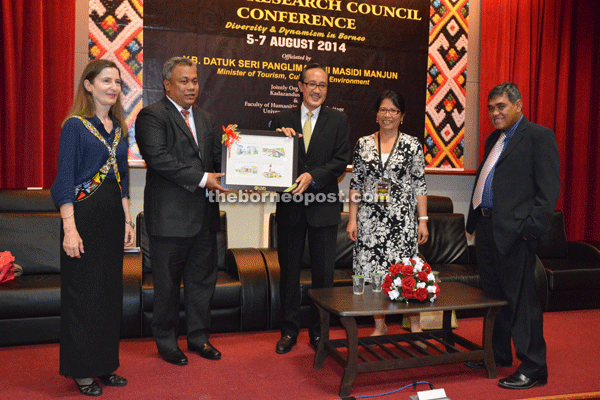KOTA KINABALU: Foreign tourists in Sabah welcome the extension of the partial curfew imposed within the Eastern Sabah Security Zone (ESSZone), said Tourism, Culture and Environment Minister Datuk Masidi Manjun.

Masidi (centre) receiving a souvenir from UMS Deputy Vice Chancelleor Professor Dr Sharil Yusof at the opening of the conference yesterday.
He said visitors felt safer and more confident with the security in areas where the curfew was extended for another two weeks till the middle of this month after the previous 14-day curfew ended last week.
“Surprisingly, based on the feedback I received from the islands and resorts affected, the tourists were happy with the curfew. They felt safer and confident to move around the resort where they are staying during the curfew period,” he said.
He was asked to comment on the curfew extension during a press conference for the opening of the 12th International Borneo Research Council Conference hosted by Universiti Malaysia Sabah (UMS) here yesterday.
Masidi said the improving sentiment among visitors had seen the backlash of the recent kidnapping for ransom gradually receding, with popular tourism spots on the east coast starting to record high volume of holiday makers again.
Most of the resorts in the area, including Mabul island where the kidnapping took place, were fully booked, he added.
“Hopefully things will get better from now on. The incidents affected only the arrivals of the Chinese tourists but we have been continuing our promotional efforts in the republic. While we will continue to do this, we will also expand our market elsewhere,” he said.
He admitted that the curfew had minor undesirable effects on the local fishing community as they could not go out to sea during the 12-hour curfew period, which starts from 6pm daily.
He said the extension, which will be reviewed on August 17, is only imposed in waters beyond three nautical miles from land, and would not affect local fishermen that much as they do not usually venture that far out for their daily fishing trip.
“Of course, some fishermen are affected and we have been informed that they can get exemption from the police. The security authorities are using this (curfew) for identifying the best long-term measures that can be adopted in future,” he said.
Fishermen in the area however were reportedly unhappy with the extension as they struggled to keep afloat and make full use of the limited period when they are allowed to fish.
An online news portal in a report yesterday quoted Tawau Fishermen Association’s chairman Hasan Timbasal, as saying it was difficult to even make ends meet, with income going down from bad to worse since the curfew.
Hasan said his members were forced to work extra hours during the day to ensure there is enough to sell, and if they are lucky, some extra for their families own consumption.
While small boats which normally operate closer to shore are not that badly affected, commercial fishing trawlers that usually go out at night to do fishing were facing a hard time dealing with the curfew.
On a separate issue, Masidi advised the public to remain cool and not react to inflammatory racial and religious remarks that are increasingly circulated in social media.
He said readers must be smart in choosing what to digest and be careful not to believe unfounded allegations spread by irresponsible groups and individuals.
“These provocative statements are spread by lonely attention seekers. They want to incite racial tension and hatred. Let us not be sucked into their games and become the spokespersons that help get their negative messages across,” he said.
Meanwhile, Chief Minister Datuk Seri Musa Aman in his opening speech delivered by Masidi at the function, urged participants of the Borneo Research Council biennial conference to take the opportunity to update their knowledge and exchange experiences on Borneo’s rich culture and ecosystems.
Being the third largest island in the world and located in the centre of South East Asia, he said Borneo is not only geographically significant but also home to some of the last pristine rain forests and montane forests in the world.
The seas surrounding Borneo are also home to diverse marine species, some of which are significantly unique could not be found elsewhere in the world.
Genetics research in Borneo is also providing clues to issues in medicine, for example, it has been shown in Borneo that thalassemia genes protect its carriers from malaria.
“Another point to stress on is Borneo’s multicultural diversity, and acceptance of one another despite holding different faiths and ethnicity,” he said.
